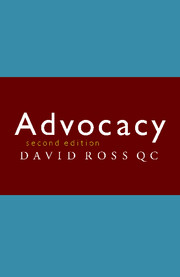Book contents
- Frontmatter
- Contents
- Foreword
- 1 The nature of advocacy
- 2 Preparation
- 3 Witnesses and questions
- 4 Examination-in-chief
- 5 Cross-examination: its qualities
- 6 Cross-examination: method and style
- 7 Cross-examination of experts
- 8 Cross-examination on documents
- 9 Re-examination
- 10 Admissibility, objections and submissions
- 11 The addresses
- 12 Plea in mitigation
- 13 Appeals
- 14 Legal writing
- 15 Etiquette and ethics
- Index
- Frontmatter
- Contents
- Foreword
- 1 The nature of advocacy
- 2 Preparation
- 3 Witnesses and questions
- 4 Examination-in-chief
- 5 Cross-examination: its qualities
- 6 Cross-examination: method and style
- 7 Cross-examination of experts
- 8 Cross-examination on documents
- 9 Re-examination
- 10 Admissibility, objections and submissions
- 11 The addresses
- 12 Plea in mitigation
- 13 Appeals
- 14 Legal writing
- 15 Etiquette and ethics
- Index
Summary
General
[13000] An appeal is a call to a higher tribunal to alter the decision of a lower one.
[13005] The best-known type of appeal is from the decision of a jury in a criminal case. Counsel for a convicted person will tell an appeal court that the judge allowed wrong evidence to be given or stopped evidence being given that should have been allowed. An excellent example is where a court set aside a conviction because a trial judge had wrongly used discretion to allow a jury to hear evidence of a confession made under duress in a foreign country.
[13010] There may be an argument that the judge did not give proper directions to the jury. An example is Green, where the accused said that his confession was false. The appeal against conviction was allowed because the trial judge did not tell the jury that there is no presumption that a confession is true.
[13015] On sentence an accused can argue that the sentencer was in error or that the sentence was manifestly excessive. By more recent statute, the prosecution can now appeal on error or because there is manifest inadequacy in the sentence.
[13020] But an appeal can take many forms, usually depending on where the case was first heard. The decision of a minister can go to the Administrative Appeals Tribunal. In fact there can be an appeal from all sort of administrative decisions.
- Type
- Chapter
- Information
- Advocacy , pp. 137 - 146Publisher: Cambridge University PressPrint publication year: 2007

